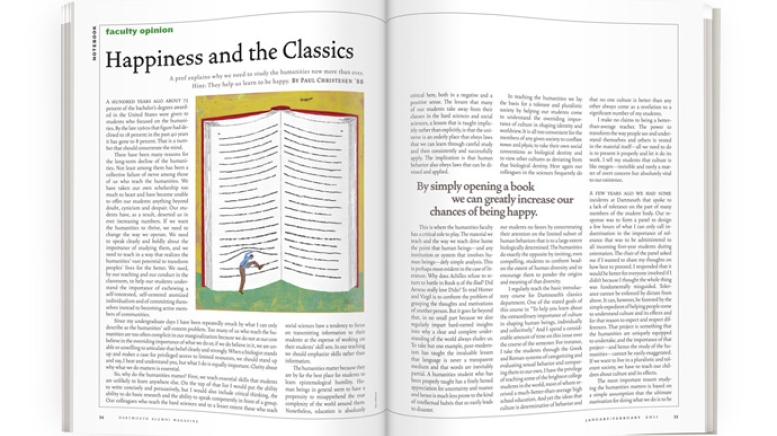A hundred years ago about 75 percent of the bachelor’s degrees awarded in the United States were given to students who focused on the humanities. By the late 1960s that figure had declined to 18 percent; in the past 40 years it has gone to 8 percent. That is a number that should concentrate the mind.
There have been many reasons for the long-term decline of the humanities. Not least among them has been a collective failure of nerve among those of us who teach the humanities. We have taken our own scholarship too much to heart and have become unable to offer our students anything beyond doubt, cynicism and despair. Our students have, as a result, deserted us in ever increasing numbers. If we want the humanities to thrive, we need to change the way we operate. We need to speak clearly and boldly about the importance of studying them, and we need to teach in a way that realizes the humanities’ vast potential to transform peoples’ lives for the better. We need, by our teaching and our conduct in the classroom, to help our students understand the importance of eschewing a self-interested, self-centered atomized individualism and of committing themselves instead to becoming active members of communities.
Since my undergraduate days I have been repeatedly struck by what I can only describe as the humanities’ self-esteem problem. Too many of us who teach the humanities are too often complicit in our marginalization because we do not at our core believe in the overriding importance of what we do or, if we do believe in it, we are unable or unwilling to articulate that belief clearly and strongly. When a biologist stands up and makes a case for privileged access to limited resources, we should stand up and say, I hear and understand you, but what I do is equally important. Clarity about why what we do matters is essential.
So, why do the humanities matter? First, we teach essential skills that students are unlikely to learn anywhere else. On the top of that list I would put the ability to write concisely and persuasively, but I would also include critical thinking, the ability to do basic research and the ability to speak competently in front of a group. Our colleagues who teach the hard sciences and to a lesser extent those who teach social sciences have a tendency to focus on transmitting information to their students at the expense of working on their students’ skill sets. In our teaching we should emphasize skills rather than information.
The humanities matter because they are by far the best place for students to learn epistemological humility. Human beings in general seem to have a propensity to misapprehend the true complexity of the world around them. Nonetheless, education is absolutely critical here, both in a negative and a positive sense. The lesson that many of our students take away from their classes in the hard sciences and social sciences, a lesson that is taught implicitly rather than explicitly, is that the universe is an orderly place that obeys laws that we can learn through careful study and then consistently and successfully apply. The implication is that human behavior also obeys laws that can be divined and applied.
This is where the humanities faculty has a critical role to play. The material we teach and the way we teach drive home the point that human beings—and any institution or system that involves human beings—defy simple analysis. This is perhaps most evident in the case of literature. Why does Achilles refuse to return to battle in Book 9 of the Iliad? Did Aeneas really love Dido? To read Homer and Virgil is to confront the problem of grasping the thoughts and motivations of another person. But it goes far beyond that, in no small part because we also regularly impart hard-earned insights into why a clear and complete understanding of the world always eludes us. To take but one example, post-modernism has taught the invaluable lesson that language is never a transparent medium and that words are inevitably partial. A humanities student who has been properly taught has a finely honed appreciation for uncertainty and nuance and hence is much less prone to the kind of intellectual hubris that so easily leads to disaster.
In teaching the humanities we lay the basis for a tolerant and pluralistic society by helping our students come to understand the overriding importance of culture in shaping identity and worldview. It is all too convenient for the members of any given society to conflate nomos and physis, to take their own social conventions as biological destiny and to view other cultures as deviating from that biological destiny. Here again our colleagues in the sciences frequently do our students no favors by concentrating their attention on the limited subset of human behaviors that is to a large extent biologically determined. The humanities do exactly the opposite by inviting, even compelling, students to confront head-on the extent of human diversity and to encourage them to ponder the origins and meaning of that diversity.
I regularly teach the basic introductory course for Dartmouth’s classics department. One of the stated goals of this course is: “To help you learn about the extraordinary importance of culture in shaping human beings, individually and collectively.” And I spend a considerable amount of time on this issue over the course of the semester. For instance, I take the students through the Greek and Roman systems of categorizing and evaluating sexual behavior and comparing them to our own. I have the privilege of teaching some of the brightest college students in the world, most of whom received a much-better-than-average high school education. And yet the ideas that culture is determinative of behavior and that no one culture is better than any other always come as a revelation to a significant number of my students.
I make no claims to being a better-than-average teacher. The power to transform the way people see and understand themselves and others is vested in the material itself—all we need to do is to present it properly and let it do its work. I tell my students that culture is like oxygen—invisible and rarely a matter of overt concern but absolutely vital to our existence.
A few years ago we had some incidents at Dartmouth that spoke to a lack of tolerance on the part of many members of the student body. Our response was to form a panel to design a few hours of what I can only call indoctrination in the importance of tolerance that was to be administered to all incoming first-year students during orientation. The chair of the panel asked me if I wanted to share my thoughts on how best to proceed. I responded that it would be better for everyone involved if I didn’t because I thought the whole thing was fundamentally misguided. Tolerance cannot be enforced by dictate from above. It can, however, be fostered by the simple expedient of helping people come to understand culture and its effects and for that reason to expect and respect differences. That project is something that the humanities are uniquely equipped to undertake, and the importance of that project—and hence the study of the humanities—cannot be easily exaggerated. If we want to live in a pluralistic and tolerant society, we have to teach our children about culture and its effects.
The most important reason studying the humanities matters is based on a simple assumption that the ultimate motivation for doing what we do is to be happy. The humanities help people learn how to be happy.
This is a subject about which I speak to my students all the time, and they regularly retort that it is not possible to learn how to be happy or to seek happiness. Many of my students see happiness as roughly the same as the weather—it comes and goes without any ability on our part to influence it.
I am aware of the research that shows there is a strong genetic component in individuals’ temperaments and hence their likelihood of being happy. Genetics is no more than a single relevant factor. It does not determine our fate. I am perhaps a naïve humanist, but it seems to me that when it comes to happiness our decisions and actions are profoundly important.
Even if you agree with that, you may wonder what any of this has to do with the humanities. The connection is to be found in cultures, each of which is built around a limited number of what philosopher Charles Taylor has called “hypergoods.” Taylor defines these as goods “which not only are incomparably more important than others but provide the standpoint from which these must be weighed, judged, decided about.”
There is always an implicit assumption that successful pursuit of the hypergoods of the society in which an individual lives will make her or him happy. This is most easily seen in Americans’ attitude toward money. There is a line in David Mamet’s movie Heist in which a character played by Danny DeVito says, “Everybody needs money. That’s why they call it money.” I suspect that Mamet’s point was that money is so fundamentally important that its pursuit requires no explanation. A few years ago I had a conversation with a student who was about to graduate and had a Wall Street job waiting for him. I asked him why he had taken the job, and he said without hesitation that he had taken the job because it paid very well. I then asked him if he could explain why the money was important to him. He looked completely baffled. It was Mamet all over again. I asked him if he thought that making a great deal of money would make him happy, and he said, of course, as if I had asked him if the sky is blue or if water is wet.
It’s a reasonable assumption that that student is now indeed making a great deal of money, but it is not a reasonable assumption that making a great deal of money has made him happy. I say that in part because a great deal of recent research, carried out by people such as Daniel Kahneman at Princeton, has shown that incomes beyond about $75,000 have virtually no measurable effect on peoples’ happiness. Put another way, based purely on their incomes, a Dartmouth professor is about as likely to be happy as a Wall Street banker who makes $4 million a year.
I have delved into the subject of money because it illustrates a simple but important fact: People tend to unreflectively pursue the hypergoods of the society into which they were born. The problem is that there is no guarantee that acquiring large amounts of a society’s hypergoods will make any given individual happy. The humanities can help lead our students to some critical realizations about what may not make them happy, and help students harvest the rich fruits of thousands of years of people thinking about what actually does make human beings happy. We can benefit from the insights of some of the smartest people who ever lived simply by opening a book. What this means in practice is that we can indeed learn how to be happy, or at least greatly increase our chances of being happy. This in fact is the conclusion Aristotle reaches in The Nicomachean Ethics. He argues that we can consciously pursue happiness and that “to entrust to chance what is greatest and most noble would be a very defective arrangement.”
Another topic about which the humanities have a lot to say, as exemplified by Artistotle in Politics, is that human beings are by nature meant to live in a community. I dwell on this point because I have become more and more convinced during the past few years that one of the single biggest problems with which Americans are currently wrestling is a commitment to individualism that has been taken to an almost pathological extreme.
Even as individualism helps ensure that people have the freedom to make lives that suit them and strong incentives for achievement, there has also from the outset been the potential for Americans to push individualism so far as to become completely alienated from the communities and society in which they live. By the end of the 19th century there was a widespread feeling that American society was literally disintegrating because individuals were pursuing their own interests without any regard for the well-being of others. That feeling gave rise to the Progressive movement, which was based on the belief that individualism needed to be balanced by a concern for others. This concern was expressed not just in words but also in action and produced nearly 75 years of highly effective social reform.
There is a general consensus that Progressivist impulses collapsed during the Vietnam War, which was followed by a shift back toward a more individualistic society, a shift that gathered force with time. That shift is evident in the contrast between the visions of America articulated by Lyndon Johnson and Ronald Reagan. One could make a good case that Reaganite individualism represented a necessary corrective to a collectivism that had lost its bearings, but it seems clear to me that the correction went too far and that we ended up with an America in which individuals were taught implicitly and explicitly that the only rational and intelligent course of action in any given situation was pursuing one’s self interest.
The rampant, unchecked individualism that came into being in late 20th- and early 21st-century America proved in fact to be detrimental both to individuals and to society. Our most recent financial crisis in part resulted from the fact that individuals on Wall Street had every incentive to make potentially catastrophic bets because it was in their self-interest to do so. The humanities have much to contribute on this front. The simple act of encountering other societies both past and present that have very different visions of the relationship between individual and community can be crucial for students accustomed to hearing only the gospel of individualism.
For students who have been taught that self-interest is the be all and end all, encountering the Greeks and Romans, with their deep-seated interest in ethics and belief in the necessity of community, can be transformative. The humanities are a great place for students to learn about the importance of being active and responsible members of communities—a lesson that carries immense significance both for individual students, because it significantly increases their chances of living happy and productive lives, and for the communities and society in which we all live.
Paul Christesen has taught in the classics department since 1998. This essay was adapted from the first Edward Bradley lecture, which Christesen delivered in honor of Dartmouth’s longtime classics professor at the 2010 Classical Association of New England summer institute held on campus last July. The entire lecture can be read here.




